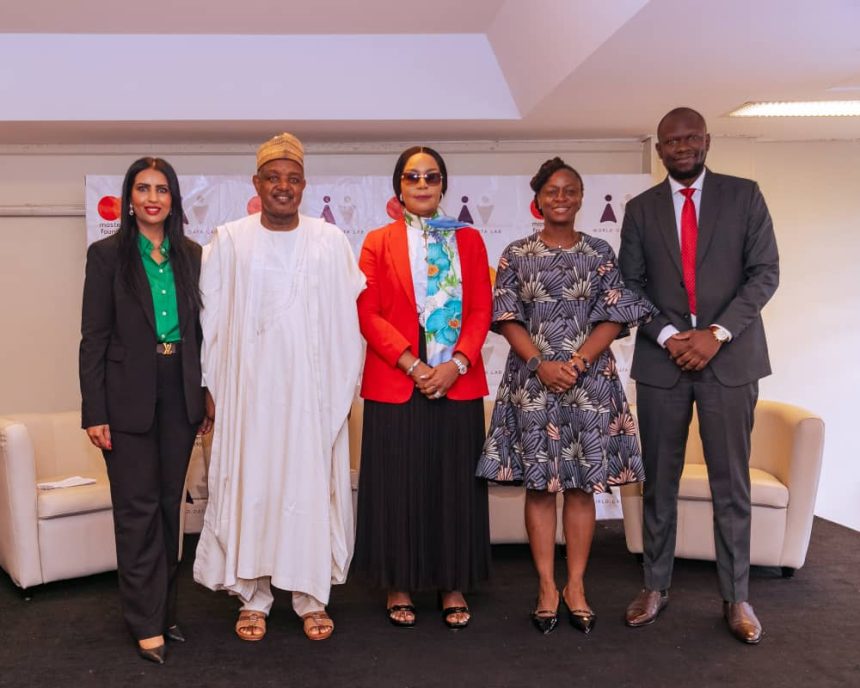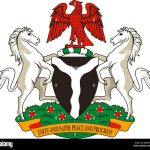L-R: Dr. Reshma Sheoraj, Vice President of Strategic Engagements,
World Data Lab, Minister of Budget and Economic Planning, Sen. Abubakar Atiku Bagudu, Minister of Labour and Employment, Hon. Nkeiruka Onyejeocha, Rosy Fynn, Country Director Nigería, Mastercard Foundation, and Tim Timbiti, Lead Strategic
Engagements, World Data Lab, launching the Africa Youth Employment Clock in Nigeria to drive inclusive African labour markets and strategic decision-making for labor ecosystem stakeholders.
By Chidi Ugwu
The Federal Government (FG) has commended World Data Lab (WDL) and the Mastercard Foundation for launching the Africa Youth Employment Clock, a digital tool aimed at addressing youth employment challenges in Africa.
The Africa Youth Employment Clock, launched at the Transcorp Hilton Hotel, Abuja on Tuesday, is a user-friendly and publicly available tool that monitors real-time job growth and forecasts employment trends in Africa up to 2030.
It draws from surveys and datasets made available by national statistics offices, the International Labour Organization (ILO), and the International Institute for Applied Systems Analysis (IIASA).
Hon. Nkeiruka Onyejeocha, Minister of Labour and Employment, Sen. Abubakar Atiku Bagudu, Minister of Budget and Economic Planning, both Nigerian Ministers emphasized the importance of the initiative stating that the Clock would help address the challenge of youth unemployment which has persistently plagued the African continent.
Senator Bagudu said ” we hope that this initiative with help in drawing attention to the resilience, energy and hardworking youths in the African continent”
He reiterated that Nigerians youths and indeed Africans willingness to work and contribute to global prosperity, adding ” we don’t want our children to go abroad out of want, we want them for go out of choice’.
In her remarks, Hon. Nkeiruka Onyejeocha, Minister of Labour and Employment, emphasized that youth employment is vital for Nigeria’s socio-economic future.
According to Onyejeocha, youth unemployment present a serious challenge as 245 million young Africans are currently unemployed.
“In the entire Africa, youth employment is a pressing challenge. As we gather here we are confronted with a stark challenge. An estimated 245 million young Africans are unemployed”
Also speaking during the event, Dr. Reshma Sheoraj, Vice President Strategic Engagements, World Data Lab, noted that Youth Population Growth projects Africa will see its highest youth population growth this decade, with an increase of nearly 100 million young people between 2023 and 2030.
This demographic shift, Dr. Sheoraj said, underscores the urgent need for meaningful job opportunities for young Africans.
Sheoraj said the Africa Youth Employment Clock is a pioneering digital tool that monitors job growth and forecasts employment trends across Africa, disaggregated by age, gender, and sector, stressing that it aims to support policymakers and stakeholders in making informed decisions to enhance youth employment initiatives.
“Available at www.africayouthobs.io, the Clock provides comprehensive youth employment data for all 54 African nations, with detailed sub-national data for Nigeria, Ghana, Kenya, Ethiopia, and Rwanda.
“The initiative aligns with the Mastercard Foundation’s mission to enable 30 million young Africans to secure dignified work by 2030, recognizing the potential of youth as key drivers of economic growth and development across the continent.
“Aligned with our mission to enable 30 million young Africans to access dignified and fulfilling work by 2030, the Africa Youth Employment Clock will be instrumental in providing critical labour market insights. In Nigeria, where we have the continent’s largest youth population, this tool will be particularly valuable in shaping strategies that address both the challenges and opportunities young Nigerians face in the workforce. As our youth population continues to grow, we recognize their potential as dynamic leaders capable of solving local and global challenges,” said Rosy Fynn, Nigeria Country Director at the Mastercard Foundation” stated Sheoraj..
In attendance to usher in the initiative was the Statistician General and Chief Executive Officer of the National Bureau of Statistics in Nigeria, Mr. Semiu Adeyemi Adeniran, as well as key stakeholders from the National Orientation Agency (NOA), Centre for Black African Arts and Civilization (CBAAC), and Connected Development (CODE).












